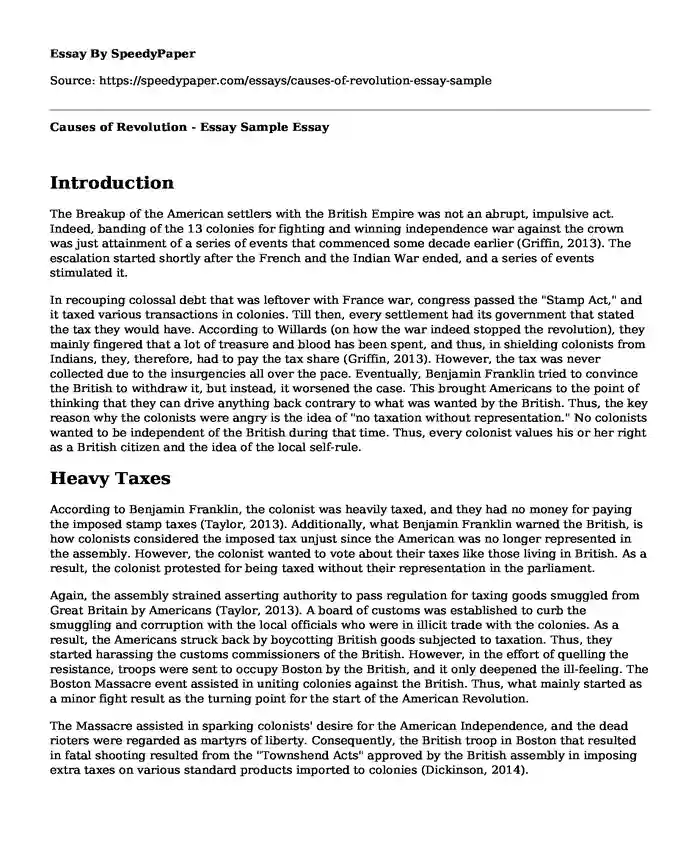
| Type of paper: | Essay |
| Categories: | Tax system Revolution World Benjamin Franklin |
| Pages: | 3 |
| Wordcount: | 612 words |
Introduction
The Breakup of the American settlers with the British Empire was not an abrupt, impulsive act. Indeed, banding of the 13 colonies for fighting and winning independence war against the crown was just attainment of a series of events that commenced some decade earlier (Griffin, 2013). The escalation started shortly after the French and the Indian War ended, and a series of events stimulated it.
In recouping colossal debt that was leftover with France war, congress passed the "Stamp Act," and it taxed various transactions in colonies. Till then, every settlement had its government that stated the tax they would have. According to Willards (on how the war indeed stopped the revolution), they mainly fingered that a lot of treasure and blood has been spent, and thus, in shielding colonists from Indians, they, therefore, had to pay the tax share (Griffin, 2013). However, the tax was never collected due to the insurgencies all over the pace. Eventually, Benjamin Franklin tried to convince the British to withdraw it, but instead, it worsened the case. This brought Americans to the point of thinking that they can drive anything back contrary to what was wanted by the British. Thus, the key reason why the colonists were angry is the idea of "no taxation without representation." No colonists wanted to be independent of the British during that time. Thus, every colonist values his or her right as a British citizen and the idea of the local self-rule.
Heavy Taxes
According to Benjamin Franklin, the colonist was heavily taxed, and they had no money for paying the imposed stamp taxes (Taylor, 2013). Additionally, what Benjamin Franklin warned the British, is how colonists considered the imposed tax unjust since the American was no longer represented in the assembly. However, the colonist wanted to vote about their taxes like those living in British. As a result, the colonist protested for being taxed without their representation in the parliament.
Again, the assembly strained asserting authority to pass regulation for taxing goods smuggled from Great Britain by Americans (Taylor, 2013). A board of customs was established to curb the smuggling and corruption with the local officials who were in illicit trade with the colonies. As a result, the Americans struck back by boycotting British goods subjected to taxation. Thus, they started harassing the customs commissioners of the British. However, in the effort of quelling the resistance, troops were sent to occupy Boston by the British, and it only deepened the ill-feeling. The Boston Massacre event assisted in uniting colonies against the British. Thus, what mainly started as a minor fight result as the turning point for the start of the American Revolution.
The Massacre assisted in sparking colonists' desire for the American Independence, and the dead rioters were regarded as martyrs of liberty. Consequently, the British troop in Boston that resulted in fatal shooting resulted from the "Townshend Acts" approved by the British assembly in imposing extra taxes on various standard products imported to colonies (Dickinson, 2014).
Conclusion
Thus, the Boston Massacre had significant impacts between the American colonists and the British relation. It additionally incensed colonists' awareness of British rule and the unfair taxation that incited them to fight for their independence. Another cause of the revolution was the boiling of the simmering tension between the Boston resident and the British occupiers in a late afternoon. After the Americans started taunting the British, the British soldiers lost their control and began firing them. This Massacre becomes of the useful colonist tool for propaganda.
References
Dickinson, H. T. (2014). Britain and the American Revolution. Routledge.
Griffin, P. (2013). American Revolution. The WileyBlackwell Encyclopedia of Social and Political Movements.
Taylor, P. M. (2013). The American Revolution. Manchester University Press.
Cite this page
Causes of Revolution - Essay Sample. (2023, Dec 12). Retrieved from https://speedypaper.com/essays/causes-of-revolution-essay-sample
Request Removal
If you are the original author of this essay and no longer wish to have it published on the SpeedyPaper website, please click below to request its removal:
- Law Essay Example on Judicial Philosophy and Ideology
- Free Essay Example on the Impacts of Forced Migration
- Essay Example: A Just State
- Landing of Columbus in Our Ready-to-Download Essay Example
- Paper Example: Religion and Religious Gender Roles Construct
- Free Essay. International Migration and Social Theory by Karen O'reilly
- Essay Sample on Cecil Rhodes and Theodore Roosevelt
Popular categories




